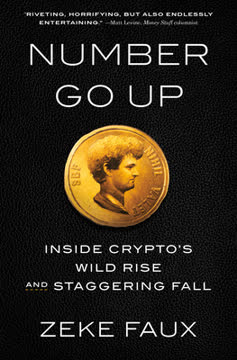Key Takeaways
1. WeWork's meteoric rise fueled by charismatic leadership and bold vision
"Adam Neumann wasn't just selling office space—he was selling a movement."
A revolutionary concept. WeWork started as a simple idea: transform traditional office spaces into vibrant, community-driven workplaces for freelancers, startups, and established companies alike. Adam Neumann and Miguel McKelvey, the co-founders, envisioned a world where work wasn't just a place you go, but a lifestyle you embrace.
Rapid growth and valuation. The company's expansion was breathtaking:
- 2010: First WeWork location opens in New York City
- 2014: Valued at $1.5 billion
- 2017: Valued at $20 billion
- 2019: Peaked at a $47 billion valuation
This explosive growth was fueled by Neumann's charisma, ambitious vision, and ability to convince investors that WeWork was more than just a real estate company—it was a tech company poised to revolutionize the way people work.
2. Adam Neumann's unconventional management style and eccentric behavior
"Neumann's penchant for grandiose proclamations and wild parties became as much a part of WeWork's identity as its sleek office spaces."
Cult of personality. Neumann cultivated an almost messianic image, positioning himself as a visionary leader who could solve global problems through WeWork. His management style was marked by:
- Impulsive decision-making
- Lavish spending on company events and personal indulgences
- Blurring of personal and professional boundaries
Controversial practices. Neumann's behavior raised eyebrows and ethical concerns:
- Leasing buildings he owned back to WeWork
- Trademarking the "We" name and selling it back to the company for $5.9 million
- Frequent substance use during work hours and meetings
These practices, while initially overlooked due to the company's rapid growth, would later come under intense scrutiny and contribute to WeWork's downfall.
3. The power of storytelling and branding in attracting investors
"WeWork wasn't selling square footage—it was selling a dream."
Crafting a compelling narrative. WeWork's success in attracting investment was largely due to its ability to position itself as more than just a real estate company. The company's narrative focused on:
- Creating a global community
- Revolutionizing the way people work and live
- Leveraging technology to optimize space utilization
Marketing prowess. WeWork's branding efforts were sophisticated and far-reaching:
- Sleek, modern office designs that became instantly recognizable
- High-profile partnerships with celebrities and influencers
- Emphasis on sustainability and social impact
This narrative allowed WeWork to command tech-company valuations despite its fundamentally real estate-based business model. Investors were buying into a vision of the future, not just a traditional office-leasing company.
4. WeWork's rapid expansion and questionable business practices
"Growth at all costs became WeWork's mantra, even as losses mounted."
Aggressive expansion strategy. WeWork's growth was relentless and global:
- Opening new locations at a breakneck pace
- Expanding into new markets and countries rapidly
- Diversifying into areas like education (WeGrow) and co-living (WeLive)
Financial red flags. Despite its growth, WeWork's business model showed significant weaknesses:
- Massive losses: $1.9 billion loss on $1.8 billion revenue in 2018
- High customer acquisition costs
- Long-term lease obligations vs. short-term customer commitments
- Creative accounting practices to mask true financial health
This expansion strategy prioritized growth over profitability, a approach that would ultimately prove unsustainable and contribute to the company's near-collapse.
5. The role of SoftBank and its Vision Fund in WeWork's growth
"Masayoshi Son's backing turned WeWork from a unicorn into a financial behemoth—and ultimately hastened its fall."
SoftBank's massive investment. The Japanese conglomerate, led by Masayoshi Son, became WeWork's largest investor:
- Initial $4.4 billion investment in 2017
- Subsequent investments totaling over $10 billion
Vision Fund's influence. SoftBank's involvement had profound effects on WeWork:
- Encouraged even more rapid expansion
- Pushed for higher valuations
- Created pressure for an IPO to provide returns
The relationship between WeWork and SoftBank was symbiotic but ultimately problematic. SoftBank's deep pockets allowed WeWork to pursue its aggressive growth strategy, but also created unrealistic expectations and valuations that would prove difficult to justify to public market investors.
6. The unraveling of WeWork's IPO and subsequent fallout
"WeWork's IPO filing was meant to be a triumphant moment—instead, it exposed the company's flaws for all to see."
IPO fiasco. WeWork's attempt to go public in 2019 quickly turned disastrous:
- S-1 filing revealed massive losses and questionable governance
- Intense media scrutiny of Neumann's behavior and conflicts of interest
- Rapidly declining valuation estimates
Consequences. The failed IPO led to a cascade of events:
- Adam Neumann forced to step down as CEO
- Massive layoffs and cost-cutting measures
- Near-bankruptcy, averted only by SoftBank's bailout
The IPO process exposed WeWork's fundamental weaknesses, forcing a reckoning with its inflated valuation and unsustainable business practices. The company that once aimed to "elevate the world's consciousness" was brought crashing back to earth.
7. Lessons learned from WeWork's cautionary tale for startups and investors
"WeWork's story is a testament to the dangers of prioritizing growth and vision over sound business fundamentals."
Startup lessons:
- Sustainable growth trumps rapid expansion
- Corporate governance matters, even for private companies
- Charisma is not a substitute for a viable business model
Investor takeaways:
- Due diligence is crucial, regardless of hype or FOMO
- Beware of companies that blur the lines between industries
- Founder-centric companies carry unique risks
The WeWork saga serves as a stark reminder of the potential pitfalls in the startup ecosystem. It highlights the need for balanced growth, transparent governance, and a focus on fundamental business metrics. For investors, it underscores the importance of thorough analysis and skepticism, even in the face of seemingly unstoppable momentum.
Last updated:
FAQ
What's The Cult of We about?
- WeWork's Rise and Fall: The book chronicles the rapid ascent and subsequent collapse of WeWork, co-founded by Adam Neumann, highlighting its peak valuation of nearly $47 billion.
- Investment Culture: It examines the investment culture that fueled WeWork's growth, focusing on major investors like SoftBank and their funding strategies.
- Broader Themes: The narrative explores themes of ambition, excess, and the cult of personality in Silicon Valley, questioning modern capitalism and unchecked growth.
Why should I read The Cult of We?
- Startup Culture Insight: Offers a deep dive into Silicon Valley's startup culture, showing how charisma can overshadow sound business practices.
- Leadership Lessons: Provides valuable insights into leadership and governance, highlighting the pitfalls of founder-centric companies.
- Economic Context: Contextualizes WeWork's story within broader economic trends, serving as a cautionary tale about prioritizing growth over sustainability.
What are the key takeaways of The Cult of We?
- Sustainable Growth: Emphasizes the dangers of rapid growth without a sustainable business model, as illustrated by WeWork's collapse.
- Investor Influence: Highlights the critical role investors play in shaping a company's trajectory, often enabling reckless behavior.
- Founder Cult: Discusses the "cult of the founder" phenomenon, where charismatic leaders are given unchecked power, leading to poor decision-making.
How did Adam Neumann's leadership style impact WeWork?
- Charismatic Leadership: Neumann's charisma attracted investment and a loyal following, contributing to WeWork's initial success.
- Lack of Accountability: His leadership style led to a lack of accountability, with decisions made without board consultation.
- Conflicts of Interest: Personal investments in properties leased by WeWork created conflicts of interest, raising investor concerns.
What role did SoftBank play in WeWork's rise?
- Financial Backing: SoftBank provided billions in funding, boosting WeWork's valuation and enabling rapid expansion.
- Strategic Influence: CEO Masayoshi Son encouraged aggressive growth targets, allowing Neumann to operate with a sense of invincibility.
- Cautionary Tale: The partnership highlights the risks of relying on a single investor, as mounting losses made promises unsustainable.
How did WeWork's business model contribute to its downfall?
- Unsustainable Growth: The model of leasing long-term and subletting short-term led to financial strain and reliance on continuous funding.
- High Operating Costs: Rapid expansion resulted in high costs that outpaced revenue growth, creating a cycle of increasing losses.
- Failure to Adapt: Struggled to adapt to market changes, with a focus on branding over profitability, leading to investor skepticism.
What is "community-adjusted EBITDA" and why is it significant?
- Non-Traditional Metric: A non-standard financial metric created by WeWork to present a more favorable view of profitability.
- Misleading Representation: Allowed WeWork to portray itself as profitable despite significant losses, raising analyst and investor concerns.
- Investor Confidence Impact: Contributed to a perception of WeWork as a tech company, leading to a loss of confidence when true finances were revealed.
How did the culture at WeWork evolve over time?
- Startup to Corporate: Transitioned from a scrappy, community-oriented culture to a more corporate environment with increased hierarchy.
- Party Atmosphere: Known for a party-like atmosphere, attracting young employees but raising professionalism concerns.
- Leadership Disconnect: As Neumann became more removed, a disconnect grew between leadership and staff, affecting morale.
How did the failed IPO affect WeWork's future?
- Investor Confidence Loss: The failed IPO led to a significant drop in valuation and difficulty securing additional funding.
- Operational Changes: Prompted leadership restructuring and cost-cutting to stabilize the company.
- Business Strategy Shift: Refocused on core office space subleasing, shedding extraneous ventures for survival.
What lessons can be learned from The Cult of We?
- Strong Governance Need: Emphasizes the importance of robust corporate governance to prevent excesses of charismatic leaders.
- Investor Reality Check: Cautions investors to look beyond hype and charisma, highlighting the need for due diligence.
- Vision and Practicality Balance: Stresses the need for leaders to balance ambitious visions with practical business considerations.
How did the Neumanns' personal lives intertwine with WeWork?
- Lavish Lifestyle: The Neumanns' extravagant spending was often funded by WeWork, raising ethical concerns.
- Family Involvement: Rebekah Neumann's role in WeWork influenced the company's direction, often overshadowing business needs.
- Public Perception: Their personal choices became part of WeWork's narrative, clashing with business realities and contributing to its downfall.
What are the best quotes from The Cult of We and what do they mean?
- “If you do the right thing, you make the most money.”: Reflects Neumann's belief in ethical business practices, though often clashing with WeWork's reality.
- “We’re disconnected.”: Highlights WeWork's mission to foster community, ironically contrasting with members' feelings of isolation.
- “I want to be a billionaire so fucking bad.”: Captures Neumann's ambition and desire for wealth, overshadowing ethical business considerations.
Review Summary
The Cult of We is a gripping account of WeWork's rise and fall, praised for its thorough research and engaging storytelling. Readers found the book's exploration of startup culture, corporate greed, and financial misconduct fascinating. Many compared it favorably to other corporate scandal books like "Bad Blood." The authors' clear explanations of complex financial concepts were appreciated. While some found it dry at times, most reviewers were captivated by the shocking details of Adam Neumann's hubris and the company's spectacular implosion.
Similar Books










Download PDF
Download EPUB
.epub digital book format is ideal for reading ebooks on phones, tablets, and e-readers.




